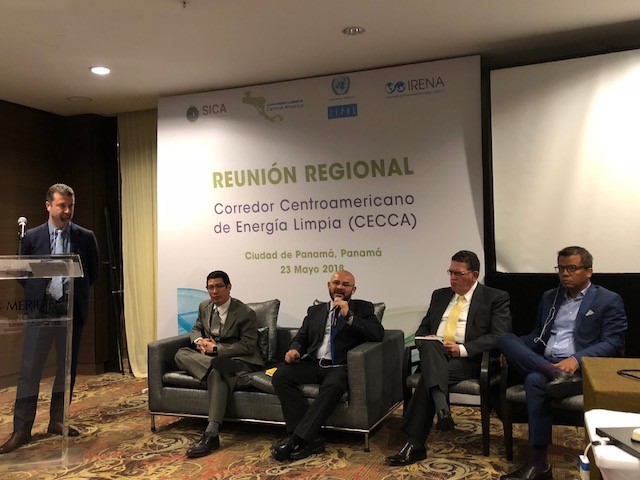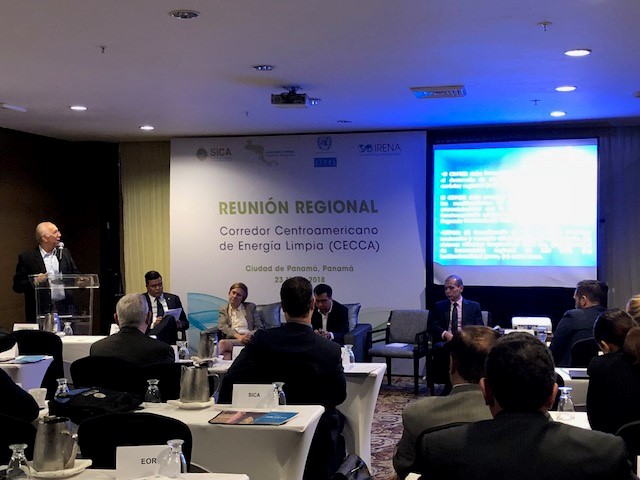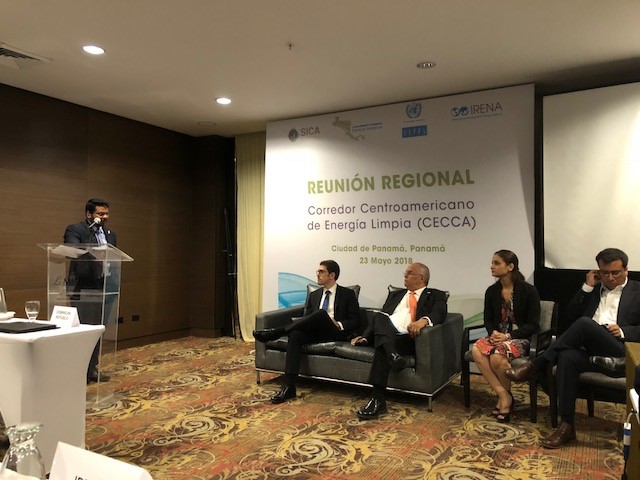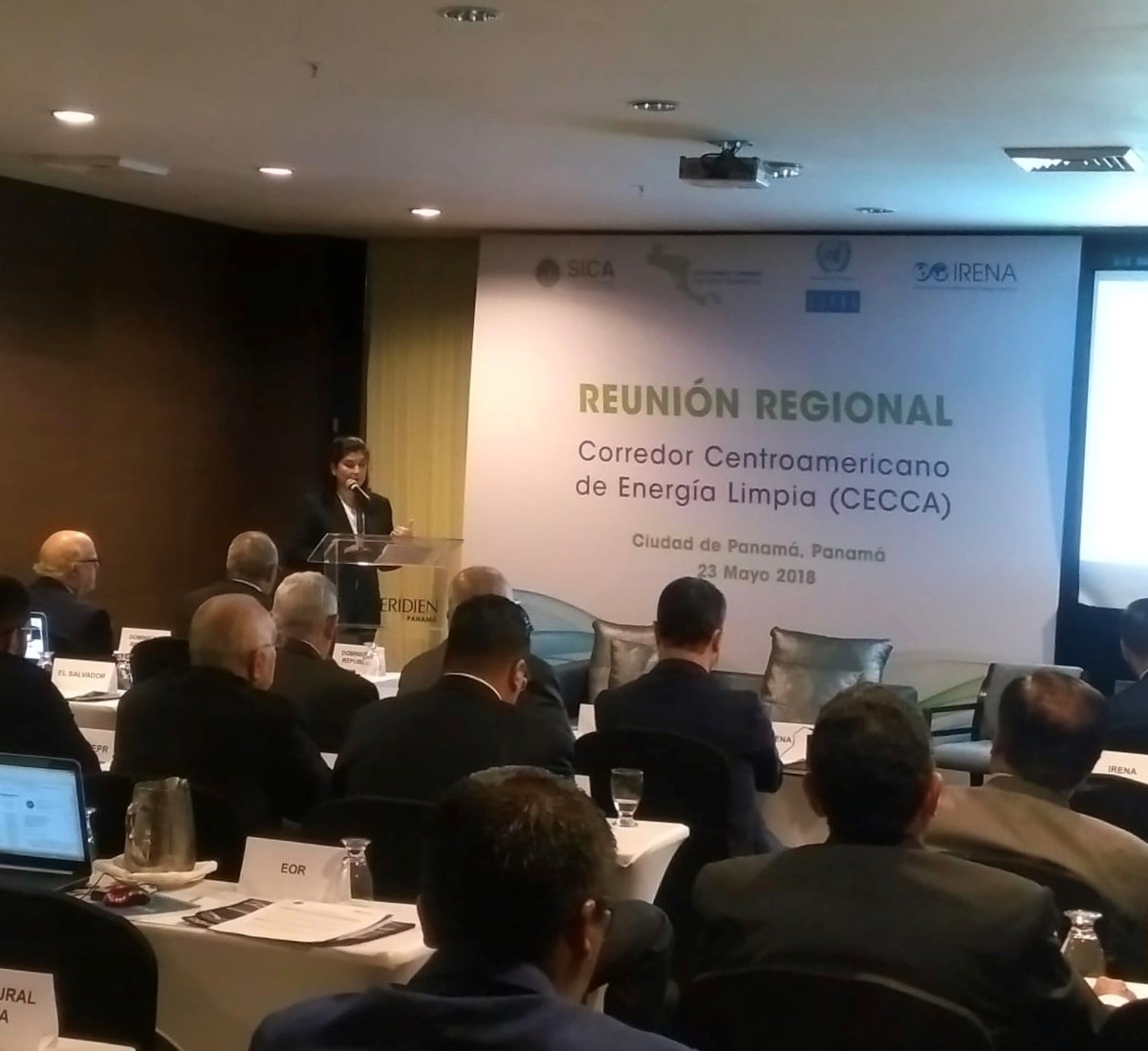
CECCA Regional Meeting

The Clean Energy Corridor of Central America (CECCA) is an initiative established in 2015 to support the accelerated deployment of renewables at the regional level, and in the context of the SIEPAC line. Since then, IRENA has been advancing the project in the region
In 2016, Panama was chosen as a pilot country, based on stakeholder consultations and expert meetings that took place the same year, two areas for support were identified, comprising a technical component and a regulatory component. Under the technical component, Panama’s power system operators have been trained in modelling variable renewable energy integration and power system analysis software. With the regulatory project, a tool has been developed to assess the design elements of power purchase agreements (PPAs) for procurement of solar and wind power in Panama.
IRENA recently held a CECCA Regional Meeting to share key findings and lessons learned from the pilot projects in Panama with a wide set of CECCA stakeholders. In doing so, discussions helped identify further capacity building and technical advisory needs and solidify future activities of the initiative across the region.
Participants included representatives from Belize, Costa Rica, Dominican Republic, El Salvador, Honduras, Nicaragua and Panama, as well as from key regional institutions such as the Regional Electric Interconnection Commission (CRIE), the Regional Operator Entity (EOR), the Board of Directors of the Regional Electricity Market (CD-MER) and the Regional Transmission Asset Owner Company (EPR) as well as a number of regional and development partners.
The meeting began with a session on IRENA’s work in Latin America, before moving into the panel session ‘Renewable Energy Power Purchase Agreements (PPAs)’, where IRENA introduced its PPA assessment tool and panellists discussed key issues impacting the design and implementation of current solar and wind energy PPAs structures in Central America. In this session, the following key points were raised by participants:
- PPA design in Central America must be improved to support VRE growth in the region;
- Current solar and wind PPAs could benefit from changing the supply commitment clause to align it closer with the output characteristics of VRE;
- The impact of VRE on Panama’s wholesale market is under study, while no significant interruption has been observed besides a need for improving reserve management (this situation is likely to change as VRE shares increase in electricity mix);
- Support on renewable energy PPAs is a critical step in the region for accelerating VRE deployment, and a key area for engagement with regulators and private sector.
In session III – Variable Renewable Energy Integration in Central America – IRENA presented the work it has undertaken within the technical component of CECCA, which was followed by a panel discussion on the main challenges for VRE grid integration in the region. During the discussion, several salient points were mentioned, including:
- Grid integration studies are becoming increasingly important as VRE integration expands rapidly in electricity systems in the region; studies must be customized to address specific issues that are a result of local conditions and constraints;
- Improving forecasting and near term power system modelling is critical for sustained VRE growth in CECCA countries;
- The Dominican Republic sees a need for customizing its grid integration assessments given the unique characteristics of its system;
- Panama views strengthened reserve calculations and forecasting as key for their power system;
- There is a need to boost coordination and standards for reserves and balancing requirements in CECCA countries;
Following this discussion, session IV – Accelerating Renewables Deployment in the Regional Electricity Market – featured individual country presentations from Belize, Costa Rica, El Salvador, Honduras, Nicaragua and Panama, in which officials provided an overview on national renewable energy markets and experiences with the regional electricity market. These presentations were followed by a panel discussion on the main barriers and potential solutions to scaling-up renewables in the regional market, where the following issues were highlighted:
- The regional transmission system is very complex in terms of operation and coordination as it is heavily interconnected with national grids, which all operate independently and autonomously;
- With varying levels of VRE in the region, it makes coordination or standardized grid operation very challenging;
- Regional coordination needs to be improved in the areas of grid balancing, reserves, and congestion management;
- It was noted that better coordination helps with optimal sharing of resources across the region and improve the cost-effectiveness of existing resources;
- A suggestion was made that the current goal should be about better coordination before moving to increased integration;
- There is a strong need for expanding support from partners to grid operators in the region, and that issues of harmonization can possibly be initiated with coordination at an operational level first.
The meeting concluded with a roundtable discussion on ‘The way forward for CECCA’, which offered the opportunity for an open dialogue among CECCA countries to provide feedback on the completed work under the initiative, and to identify priority activities in the future. IRENA presented a set of potential future activities for discussion and approval of the governments of the region.
Agenda of the CECCA Regional Meeting
Presentations from Session I ‘Supporting the Renewables Scale-up in Central America’
Regional Approach to Expanding Renewable Energy Deployment
Vanessa Interiano, Senior Adviser, IRENA
Chris Marshall, Associate Programme Officer, IRENA
Presentations from Session II ‘Renewable Energy Power Purchase Agreements (PPAs)’
PPAs for Variable Renewables
Hameed Safiullah, Program Officer, IRENA
Presentations from Session III ‘Variable Renewable Energy Integration in Central America)’
VRE Integration in Central America
Hameed Safiullah, Program Officer, IRENA
Presentations from Session IV ‘Accelerating Renewables in the Regional Electricity Market’
Country Presentations
Belize
Ryan Cobb, Energy Director, Ministry of Public Service, Energy and Public Utilities, Belize
Costa Rica
Say-Lheng Solera, Planning Secretariat, Ministry of Environment and Energy, Costa Rica
El Salvador
David Perla, Head of Energy Business, DELSUR, El Salvador
Honduras
Miguel Figueroa, Professor of Electrical Engineering, National Autonomous University of Honduras
Nicaragua
Santiago Bermudez, Electricity Market Directorate, Ministry of Energy and Mines, Nicaragua
Panama
Fernando Diaz, Director of Electricity, National Energy Secretariat, Panama
Regional Presentations
CD-MER
Teofilo de la Torre, Vice President, CD-MER
EOR
Christian Munoz, System Planning Coordinator, EOR
Presentations from Session V ‘Regional Roundtable on CECCA’
CECCA: The Way Forward
Gurbuz Gonul, Acting Director of Country Support and Partnerships, IRENA
For more information, please contact cecca@irena.org



